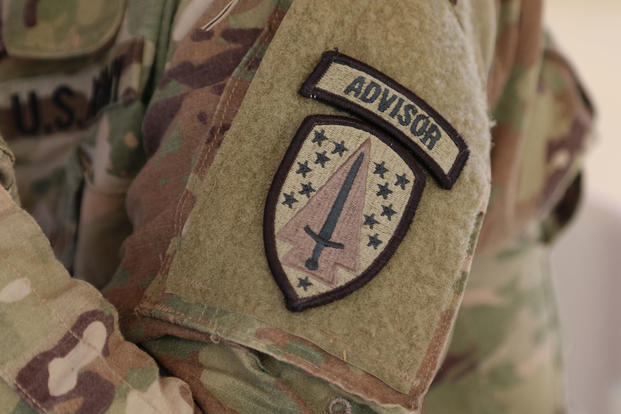The insider attacks that killed a senior enlisted soldier and a corporal in a new Army special-purpose unit were initially devastating to morale. But the events ended up strengthening members' resolve to work even more closely with the Afghans they trained, the general in charge said Wednesday.
"Continuing the mission was the best thing we could do" to honor Command Sgt. Maj. Timothy Bolyard, 42, of Thornton, West Virginia, and 20-year-old Cpl. Joseph Maciel, of South Gate, California, said Brig. Gen. Scott Jackson, commander of the 1st Security Force Assistance Brigade, or SFAB.
The deaths of Bolyard and Maciel in the so-called "green on blue" attacks last year were "tragic to us internally," Jackson said at a Pentagon briefing on the unit's nine-month deployment to Afghanistan last year. But, he said, the soldiers knew going in that such incidents were possible.
Jackson said the unit took appropriate safety measures, but had to accept risks in terms of balancing security against the need to get out with the Afghans at remote locations.
Related content:
- Soldier Killed in Insider Attack Was SFAB Command Sergeant Major
- Army IDs Infantryman Killed in Apparent Insider Attack in Afghanistan
- National Guard's New SFAB Will Be Spread Across Six States
"It didn't derail the mission," he said, adding that the relationship with their Afghan partners was ultimately stronger.
The briefing by Jackson and other officers and enlisted members of the 1st SFAB gave insight into how U.S. troops, and the Afghan security forces, have responded to insider attacks.
A total of nine U.S. troops died in Afghanistan last year, according to the Defense Department, and at least three were believed to have been the victims of insider attacks by members of the Afghan military and police.
Past attacks have led other former coalition members, including France, to withdraw their troops from Afghanistan.
Capt. Gerard Spinney, team leader of 1st Battalion, 1st SFAB, said that he was in Tarin Kowt in Afghanistan's Uruzgan province when Maciel, an infantry soldier with the 3rd Infantry Division who was assigned to security for the SFAB, was killed and two other U.S. troops were wounded in an insider attack, allegedly by a member of the Afghan National Defense and Security Forces.
The soldiers who provide force protection to advise-and-assist missions against the potential for insider attacks have come to be known as "Guardian Angels," officials said.
Spinney said Maciel was considered a member of the SFAB team. Immediately after the incident, the commander of a local Afghan kandak, or battalion, came to him, he added.
The commander was not directly in charge of the alleged killer, but "he was adamant, he was angry, he was determined on the need to rid the [Afghan] unit of anything like this," Spinney said.
"He wanted to make us feel safer," Spinney said of the commander. Together, they identified security improvements, and eventually "they took care of us."
The SFAB concept was developed by the Army to take more experienced enlisted and officer personnel and form them into a unit trained at Fort Benning, Georgia, for the advise-and-assist mission.
Bolyard's death last September in Logar province, along with the wounding of another soldier, was a major setback for the SFAB teams, and it took coordination with the Afghans to get back on track, said Command Sgt. Maj. Christopher Gunn.
Bolyard had at least seven combat deployments and was a recipient of six Bronze Stars, two of them with combat "V" device.
Jackson said the SFAB teams pressed the Afghans "to understand the impact that those kinds of green-on-blue-type incidents can have to a strategic partnership. They take it seriously, and they were ready to make the necessary changes" on security.
During the nine-month deployment by about 800 personnel, the SFAB teams worked with more than 30 kandaks and 15 Afghan brigades, according to an SFAB handout.
Much of the work involved improving logistics and resupply for Afghan forces, Spinney said, but the SFAB teams also focused on helping the Afghan forces act independently.
Spinney said his "biggest takeaway" from his time in Afghanistan was the increased ability of Afghan soldiers "to achieve tactical success without us accompanying them."
-- Richard Sisk can be reached at Richard.Sisk@Military.com.













